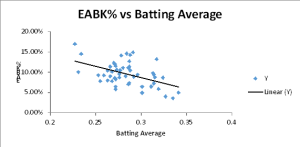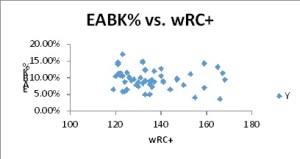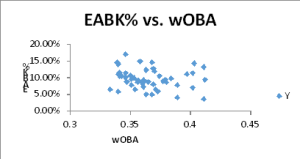Justin Upton: A Potential Value Trap for the Tigers
Justin Upton’s recent $132.75M/6-year contract with the Tigers does not seem, on the surface, like an outrageous contract. And right now it isn’t; at age 28, Justin should be hitting his prime. Since breaking in with the Diamondbacks, he has been a consistent power threat in a league where consistent power bats are few and far between. To pay $22 million for an outfielder that the Tigers control for two years, potentially six years (Upton has an opt-out clause after two seasons), does not sound extreme when you consider other contracts signed by young, dynamic outfielders; in fact the contract came in below MLB Trade Rumors’ projection of a 7-year/$147 million deal[1]. So why anyone would be concerned about Justin Upton’s deal? Maybe it’s the fact that it took a while for his market to develop this offseason, or maybe it is because he shares the same bloodline as Melvin (formerly known as B.J.) Upton whose production went in the tank after his age-28 season? I get the feeling that Justin could end up as a bad investment for the Tigers. Here’s why.
Exit Speed and Park Factors
Fortunately for Justin, he is getting out of the notorious pitcher’s kingdom that is Petco Park. Unfortunately for Justin, he is moving to another pitcher’s park, Comerica Park. Poor guy can’t catch a break. One concern that I noticed about Upton’s metrics was his exit speed on home runs. According to the ESPN Home Run Tracker, Upton had an average home-run exit speed of 105.2 mph. The concern here lies when you compare the average exit speed versus his prior years. Take a look at the chart below which compares his FB/HR%, HR totals, and average home-run exit speed.
| Year | HR | HR/FB% | Exit Speed |
| 2011 | 31 | 14.8 | 107.3 |
| 2012 | 17 | 11.0 | 107.2 |
| 2013 | 27 | 17.9 | 106.8 |
| 2014 | 29 | 17.9 | 105.5 |
| 2015 | 26 | 15.2 | 105.2 |
The numbers here do not look all that out of line, other than his 2012 season where his HR/FB% was off from the average. Upton usually sits around the high 20’s in terms of total home runs, being pretty consistent except for the outlier 2012 season. But the home-run exit speeds have decreased each of the last five seasons — some seasons the decrease was more than others, but still they have decreased nonetheless. Another aspect of Upton’s stats to look at is his 2015 home-run landing spots overlaid with an outline of Comerica’s dimensions.
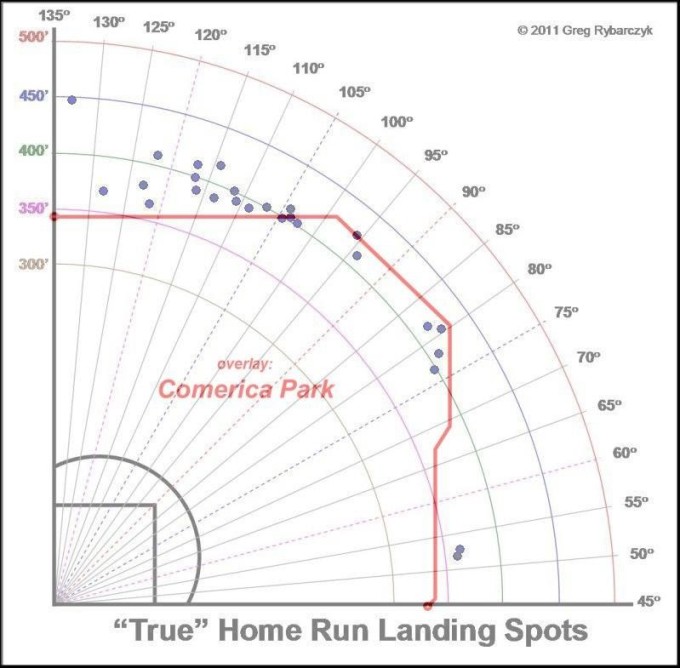
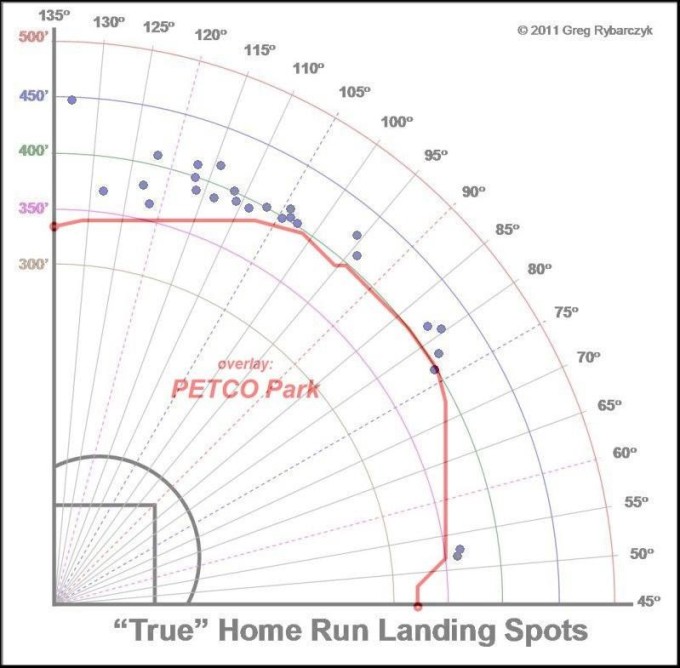
The graphs show the “True” Landing spots according to the ESPN Home Run tracker for the 2015 season. Notice that roughly eight of Upton’s 2015 home runs would not have made it out of Comerica. Only one would have stayed inside Petco, Upton’s 2015 home field. If we used the Comerica park numbers, Upton would have hit 26-8, so 18 home runs. This creates a reason to be concerned, especially since most of Upton’s value is supplied by his ability to drive the ball out of the park, and not his ability to hit for average.
So a value trap you say?
Yes, a value trap. Considering that Upton is 28, paying $22 million a year seems pretty reasonable. In fact, some baseball commentators saw it as a solid investment (and it may turn out to be such). But the caveat is Upton’s opt–out option after two years, similar to the deal Jason Heyward has. If Upton is able to continue to produce nearly 30 home runs a year, he could easily opt out and test the free-agent market again. But if an underlying metric like home-run exit speeds continues to dip and the power numbers take off downhill with it, there is no rational reason for him to opt out and test the market again when he has a $22 million/year deal locked up for four more years.
Therein lies the trap: In an effort to win now by the Tigers, they will either lose Upton after two seasons or they will get trapped by a contract that could eat $22 million of payroll a year, for four years, for a player whose power numbers have dropped and will struggle to provide value in other areas. Is it a great deal for Upton? Of course. Is it good for the Tigers? Short-term, yes. Long-term, there are very few scenarios where they emerge as a winner in the deal. Either they have to pay for Upton again after the 2017 season, or they get stuck with a player who isn’t as good as he once was. Maybe it’s just a hunch but I think the Tigers may be getting the shaft.
[1] www.mlbtraderumors.com/2015/10/justin-upton-mlb-free-agent.html
